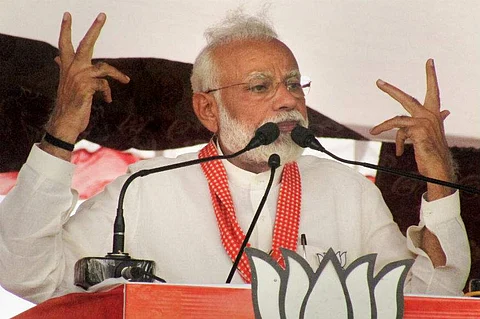

The role of caste is pivotal to Indian democracy. The role of caste in determining who shall be the candidate and minister either in a state's assembly or the parliament is rather well-known. Indian mainstream political discourse is biased towards the members of lower caste communities who assert their position within a certain caste based community. Their politics for identity is often termed as casteist by their political opponents. For instance, allegations of being casteist are regularly levelled against the Bahujan Samaj party, Samajwadi party, and Rashtriya Janata Dal. Does such an allegation reveal the truth about Indian politics or does it hide something poignant about it?
The answer would be yes for those who come from higher castes as such a discourse enables them to maintain the “caste dominance” in every sphere of Indian life. For the oppressed castes (Dalit-Bahujan), the fight is always against caste domination, and uniting all the oppressed castes means to break caste barriers by asserting caste identities. For them such assertions themselves are a means of political articulation. Their language is democratic characterised by a demand for equality, adequate representation, and recognition. Further, their political narrative aims at reinforcing the fact that oppressed castes constitute a large majority of the Indian population and have to be given their rightful representation.
However, with the rise of the Bharatiya Janata Party, one witnesses a different kind of political articulation with respect to caste. Prime Minister Narendra Modi campaigned for the 2014 general elections by identifying himself as a member of the backward caste –a Chaiwala from the Teli caste, thus manipulating the language of caste. Modi is from the Modh-Ghanchi caste in Gujarat, which is a Baniya (business) caste in the four fold Varnadharma system. But the undeniable fact is that Modi’s caste is recognised as OBC in the state category of Gujarat.
The “Modi Wave” was spun around the story of a ‘chaiwala’ who wanted to lead the nation as its Prime Minister. By 2019, ‘Chaiwala’ has been replaced with ‘Chowkidar’ sans the caste association with the latter. Modi’s electoral campaigns stand out because of his rhetorical skills and his ability to capture the attention of the masses even as his claims are far from truth. He knows well that the masses he addresses from time to time do not have the political reach or bandwidth to ask him counter questions and make themselves heard. Nevertheless, Modi is losing popularity on the ground and there has been a drastic decline in popularity from the last general election. Despite his dwindling popularity, Modi’s manipulation of the politics of caste has a potent effect especially in states like Uttar Pradesh and Bihar where people of backward castes are very conscious of their caste identities.
History tells us that the RSS and BJP have interpreted the caste system to support the Hindutva agenda. They have appropriated all the lower castes in the nationalist Hindutva agenda without ever showing the inclination to challenge or change the caste system, as it exists. After 2014, they have manipulated and confused the assertive language of caste, which has been the core part of the anti-caste tradition as imagined and nurtured by Phule, Ambedkar, Periyar and others. Both RSS and BJP started propagating the “Samajik Samrasta” social harmony, but not ‘social equality.’ Modi has created a discourse on social harmony, which is not against caste. He anchors his caste-based campaign by simply indulging in a reinterpretation of the caste system to facilitate a harmonious relationship within caste hierarchy. However, the very existence of the caste system is antithetical to the concept of social harmony as it perpetuates social hierarchy and graded inequality. Therefore, defending caste is against democracy and can never bring national unity.
Modi’s assertion of himself as a member of the backward caste can only be seen as directly to the RSS’s plan for “unification of castes”. He further takes the name of Dr Ambedkar in several speeches while campaigning against BSP supremo Mayawati. A conscious OBC would inherit the anti-caste legacy started by Mahatma Phule and Dr. Ambedkar, and would never be proud of his caste. On the contrary, in his recent speech in Uttar Pradesh while commenting on Mahagathbandhan, Modi said, “For you, to be born into a backward caste is to do politics of caste, but for me, to be born into a backward caste is to serve Bharat Mata and I am proud of my caste”. In addition to this, he reiterates, “I am from the most backward caste”. Interestingly, the idea of caste and the discourse of nationalism is very prominent in Modi’s speeches.
As the Modi wave is not gaining momentum in front of the BSP-SP Mahagatbandhan in this election, perhaps that would be the important reason why he is again trying identify himself as being from a backward caste. It is important to note that Modi is not the face of OBC politics India. 0
Jadumani Mahanand is a PhD research scholar at the Centre of Political Studies, Jawaharlal Nehru University
(Views expressed here are the author's own and do not reflect those of the organisation)
